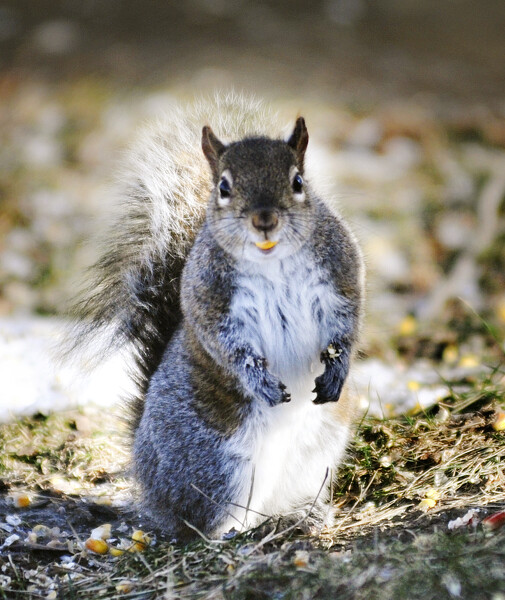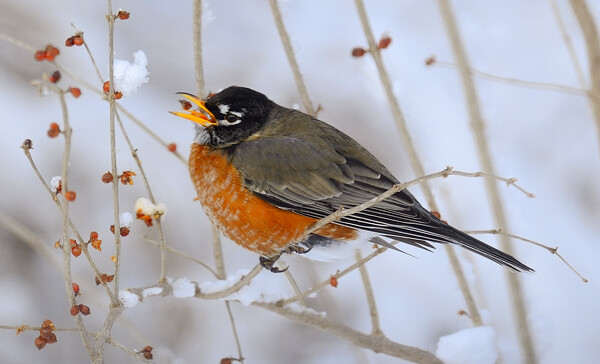
Cats and dogs during the after noon of the total solar eclipse may behave as they do during the night.
During the total solar eclipse on April 8, experts say animals, insects and plants may engage in the same activity they do when the sun goes down every day.
"Your nocturnal animals might come out for a little bit, and then your diurnal or daytime animals might go lay down for a little bit," said Jen Dennison, education and outreach manager for Ohio Department of Natural Resources Division of Wildlife.
As the moon begins to line up perfectly between the Earth and sun, birds may seek out a tree to roost in, while nocturnal animals such as owls, bats and raccoons may become active, according to Stephen Jacquemin, a biology professor at Wright State University-Lake Campus.
"If you want to anticipate or you want to project what's going to happen during the eclipse, just hang around tonight and watch the behaviors (that) happen every single day at dusk," Jacquemin told The Daily Standard.
Though experts have a pretty good idea on how creatures may behave on April 8, formal research on the effects of a total solar eclipse on a wide host of organisms is surprisingly limited due to the infrequent nature and relatively short timeframe of the celestial phenomenon.
That's even more the case in Ohio, where the last total solar eclipse happened in 1806.

As the eclipse approaches on April 8, area squirrels may retreat to their den but reemerge when it's over.
"There's not a ton of research either because it is such a short period of time. The most recent research that we have found has been from the total solar eclipse that took place in 2017," Dennison said. "There's just not a lot of time to see noticeable difference, but you'll see small little things, like the squirrels might den up for a little while but then they'll come back out again."
During the last total solar eclipse in the United States on Aug. 21, 2017, stars came out in the middle of the day, zoo animals ran in agitated circles, crickets chirped, birds fell silent and a chilly darkness settled from Oregon to South Carolina.
Mercer County is one of 35 Ohio counties projected to be in the full-totality area of the solar eclipse on April 8.
In Mercer County, this once-in-a-lifetime event will unfold between 1:53 and 4:25 p.m. The moon will appear to completely obscure the sun at 3:11 p.m., causing nighttime darkness for nearly four minutes, according to county Emergency Management Agency director Mike Robbins.
"The eclipse is not a light switch … it comes on slow and then there's a period of complete darkness and then it leaves slows," Jacquemin noted. "It really is going to be like an interesting dawn-to-dusk transition all taking place in the matter of hours."
In other words, the event will act like a second nighttime for the area's flora and fauna.
"The nocturnal animals, the diurnal animals that are active more during the day, they're absolutely going to be able to sort of go with that, and they'll gradually come online and they'll gradually go offline," he added.
Dennison said she's excited to see if certain organisms behave as she thinks they will.
"Crickets and katydids and cicadas that call during temperature changes, they may change their frequency of their call a little bit as the moon goes in front of the sun," she said. "The temperature change that will occur may change the frequency of their call."
Dennison pointed to a study that found colonial orb-weaving spiders took down their webs during totality in Mexico on July 11, 1991, and then rebuilt them once the sun reemerged, thinking it was daytime again.
"Some animals, they don't even pay any attention to it, and then others like the insects and maybe the birds, you might see a little bit of a different change," she said. "Mammals, they tend not to pay much attention to it from what we've seen."
Research from the Aug. 21, 2017, total solar eclipse in Nebraska revealed prominent insect singing, which may hold implications for Ohio, Dennison noted.
"In August, birds don't sing very much because they're not in nesting season anymore, and so we're anticipating, because ours is in April, that we may see some increase in song activity," she said. "In fact, we're wondering if when the moon passes away from the sun and when the sun comes back out if we're going to see maybe a duplication of what they call the dawn song. "
The dawn song occurs when "birds come out early in the morning and they sing like crazy," she added.

One wildlife expert is curious to see if birds begin their noisy dawn song shortly after totality.
While a total solar eclipse is exciting and impressive to witness from a human perspective, it probably amounts to just another night for wild animals, Jacquemin said.
"They're not going to develop any strange behaviors, they're not going to develop any sort of peculiarities that would necessarily stand out," he said. "What is to be expected is nighttime routines are going to kick in."
Those routines, he continued, will taper off as it becomes lighter and then kick back in "with the next night that comes on that evening."
Domesticated and captive animals amid the total solar eclipse may resort to behaviors associated with the sinking of the sun.
"If you've got a dog or cat or something like that at home and they've got a particular behavior pattern change when it starts to get darker out, you can expect that to happen," Jacquemin said. "You can expect the zoo animals that are active during the day to start to wind down and you can expect there to be a really unique period of time smack dab in the middle of the day when the nocturnal animals, their activity picks up."

Cats and dogs during the after noon of the total solar eclipse may behave as they do during the night.
Dennison offered a similar prediction about domesticated and captive animals.
"Some of the domesticated animals and even some of those zoo animals, they would start to exhibit behaviors that were more so trained because of their interactions with people than necessarily their own behaviors," she said. "So if they're used to getting fed at night then they might go back to the barn."
Back during the Aug. 21, 2017, total solar eclipse, citizen scientists monitored animal and plant behavior as day turned into twilight. About 7,000 people streamed into the Nashville Zoo just to see the animals' reaction and noticed how they got noisier at it got darker.
The giraffes started running around crazily in circles when darkness fell, and the flamingos huddled together, though zookeepers said it wasn't clear whether it was the eclipse or the noisy, cheering crowd that spooked them.
ODNR is seeking citizen scientists to report their animal, insect and plant observations on April 8. Participants must download the free iNaturalist app.
The reports collected through the initiative will help ODNR document and discern particular patterns that could bolster research in various fields, Dennison said.
"We're basically asking them to make an observation with a particular species that they're familiar with - a half hour before the total solar eclipse occurs, one during the total eclipse and then again a half an hour afterwards," she said.
Those interested can join the Ohio Wildlife Observation: Solar Eclipse 2024 project on iNaturalist.
For more information on the project and total solar eclipse, visit ohiodnr.gov/go-and-do/see-the-sights/solar-eclipse-2024.
- The Associated Press contributed to this story.


